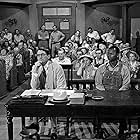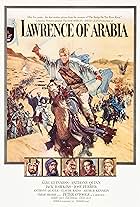Atticus Finch, a widowed lawyer in Depression-era Alabama, defends a Black man against an undeserved rape charge, and tries to educate his young children against prejudice.Atticus Finch, a widowed lawyer in Depression-era Alabama, defends a Black man against an undeserved rape charge, and tries to educate his young children against prejudice.Atticus Finch, a widowed lawyer in Depression-era Alabama, defends a Black man against an undeserved rape charge, and tries to educate his young children against prejudice.
- Won 3 Oscars
- 14 wins & 16 nominations total
- Mayella Violet Ewell
- (as Collin Wilcox)
- Man
- (uncredited)
- Director
- Writers
- All cast & crew
- Production, box office & more at IMDbPro
Storyline
Did you know
- TriviaGregory Peck's summation speech, which runs for 6 minutes and 30 seconds, was nailed in a single take.
- Goofs(at around 30 mins) When Scout and Jem are debating Jem going back to retrieve his trousers from Boo Radley's, Scout can be seen mouthing Jem's lines.
- Quotes
Atticus Finch: I remember when my daddy gave me that gun. He told me that I should never point it at anything in the house; and that he'd rather I'd shoot at tin cans in the backyard. But he said that sooner or later he supposed the temptation to go after birds would be too much, and that I could shoot all the blue jays I wanted - if I could hit 'em; but to remember it was a sin to kill a mockingbird.
Jem: Why?
Atticus Finch: Well, I reckon because mockingbirds don't do anything but make music for us to enjoy. They don't eat people's gardens, don't nest in the corncrib, they don't do one thing but just sing their hearts out for us.
- Crazy creditsThe title is revealed in a child's crayon rubbing.
- ConnectionsEdited into Passage à l'acte (1993)
I first read Harper Lee's lovely novel when I was a young teen, and it was one of those books that gave me an experience that changed the way I perceived the world and my own family. The movie stays true to the wonderful, innocent prose.
Every time I watch, I see my father in Atticus Finch. He, too, is a southerner who respects people and defends his beliefs. He also has always respected his children and treated us the way Atticus treats Scout and Jem. I also see other family and friends in various characters in the film, because we have such strong southern roots. Even the negative aspects of racial antipathy and loss of childish innocence bring certain memories to mind.
Those who did not grow up in the south or with southern families might not see parallels the way I do, but the movie would be a gem to anyone. Gregory Peck put in the performance of his career, and the children acted in the least forced manner I have ever seen. The cinematography is also beautiful, and the script is perfectly balanced-not too sparse, but also not dialogue heavy.
The best thing about "To Kill a Mockingbird" is that it preserves the spirit of the novel that resounds with so many people. This film stands as one of the best ever arguments for tolerance, loving families, and the beauty of life through a child's eyes. Everyone who watches movies ought to see it.
- Pickwick12
- Apr 5, 2004
Details
- Release date
- Country of origin
- Official site
- Language
- Also known as
- Ubiti ptico oponašalko
- Filming locations
- Production companies
- See more company credits at IMDbPro
Box office
- Budget
- $2,000,000 (estimated)
- Gross US & Canada
- $592,237
- Opening weekend US & Canada
- $357,549
- Mar 24, 2019
- Gross worldwide
- $599,146
- Runtime2 hours 9 minutes
- Color
- Sound mix
- Aspect ratio
- 1.85 : 1
Contribute to this page
























































